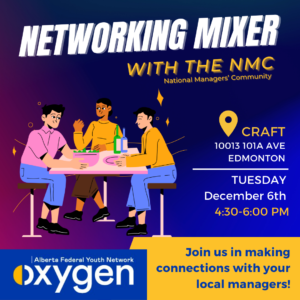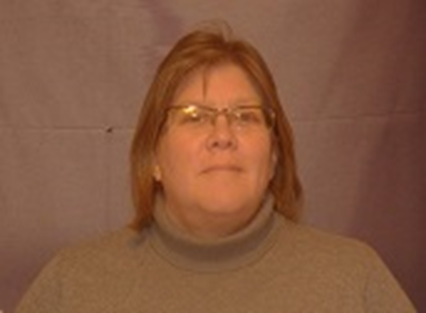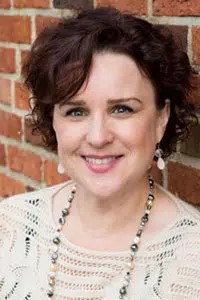Respectful Engagement!
Take advantage of this long-awaited in person event to network and reconnect with colleagues from various departments and agencies. We will explore the benefits of becoming trauma informed managers as well as reflect on what it means to foster cultural safety in your workplace.
Date and Time
Tuesday, December 6, 2022, from 8:00 AM to 4:00 PM MST
Location and registration
Art Gallery of Alberta 2 Sir Winston Churchill Sq Manning Hall, Edmonton AB
Language
This event will be English.
To note that due to space limitations and the pilot nature of the sessions, the regional events will not include simultaneous translation services. Participants will be able to submit their questions in the language of their choice and a moderator will help with translation.
Agenda
8:00 to 9:00
Registration and networking
9:00 to 12:00
Trauma-Informed Leadership – Facilitated by the Crisis & Trauma Resource Institute (CTRI)
A compassionate and trauma-informed approach to leadership is essential for creating healthy workplace cultures. Trauma is prevalent in our world and has an impact on many of the people we interact with, including staff and colleagues. This workshop explores how to lead with a trauma-informed approach and provides five key principles that trauma-informed workplaces embody. By embracing these principles, organizations can contribute to the positive transformation of individuals and relationships affected by trauma, while at the same time creating the conditions that lead to high levels of employee engagement and organizational success.
12:00 to 13:00
Lunch will NOT be provided
13:00 to 15:00
Cultural Safety, Reconciliation, and Anti-Indigenous Racisme
What it looks like? And how to assess in your organization.
Facilitated by Guest Speaker – KCII Rep
15:00 to 16:00
Round table ‘’Ask Me Anything’’ sessions with various public service Executives from AB
Mixer

At CRAFT Beer Market Edmonton (10013 101A Ave, Edmonton, AB T5J 0C3)
Speaker Bio
Carolyn Laude

Carolyn Laude has worked on a broad range of complex Indigenous affairs policy and program files at the First Nation, non-profit, post-secondary education, and government sector levels. Over the last few years, she has worked on files associated with the First Nation Oil and Gas Industry, and the topics of Anti-Racism, Reconciliation Competence and Indigenous Innovation, and Diversity and Inclusion touching on Conscious and Unconscious Bias in the workplace. She is presently completing a PhD in Legal Studies at Carleton University.
For her Comprehensive Exam, Carolyn examined the Tsilhqot’in Nation decision to understand how settler-colonial modes of reconciliation account for and/or contradict Indigenous inherent rights and socio-legal ordering on Indigenous land. Moreover, the project studied how Indigenous peoples, academics, policy commentators, the courts and government officials understand and seek reconciliation.
In her PhD work, Carolyn is presently examining whether An Act respecting the United Nations Declaration on the Rights of Indigenous Peoples can protect Indigenous inherent rights (focus on land and sovereignty in relation to resource extraction) through legislation, policies, and practices. Carolyn is exploring whether the tension between distinct lifeworld modes can be resolved. She plans to apply an Indigenous analytical framework to offer a decolonial alternative to the liberalizing of Indigenous inherent rights. One that investigates whether Indigenous ways can create ethical settler-Indigenous spaces and relations that uphold Indigenous rights, ways of knowing and being, equality, and human dignity while addressing systemic racism.
She is regularly asked to speak and has provided training to various federal departments (e.g., CIRNAC, ISC, DFO, Immigration and Citizenship, PCO, ESDC, and NRCan officials – management and staff levels) on a variety of topics, for example: •Building Shared Understanding of Reconciliation and Innovating the Path-Forward.
•Championing Inclusive Diversity in the Workplace – Building Cultural Safety Through Leadership Competencies.
•Systemic Racism.
•Cultural Safety and Indigeneity.
•Brave and Safe Spaces.
•Indigenous Inclusion.
Carolyn holds a Master’s in Legal Studies and a Bachelor of Arts Honours in Political Science with a concentration in Canadian Studies. When asked she also provides subject matter expertise on the topic of reconciliation and has taught a fourth-year undergraduate course on Indigeneity in the City for several years.
files at the First Nation, non-profit, post-secondary education, and government sector levels. Over the last few years, she has worked on files associated with the First Nation Oil and Gas Industry, and the topics of Anti-Racism, Reconciliation Competence and Indigenous Innovation, and Diversity and Inclusion touching on Conscious and Unconscious Bias in the workplace. She is presently completing a PhD in Legal Studies at Carleton University.
Danielle Forth

Danielle Forth has over 15 years of clinical experience working in front line mental health, consulting and teaching roles. She is a Registered Psychologist and holds a Master’s degree in Marital and Family Therapy. In addition to training with CTRI, she has a private clinical practice working with individuals, couples and families on a variety of mental health issues. As a therapist, Danielle brings a strong desire to facilitate excellent and enjoyable learning experiences to her workshops that reflect her compassion, warmth and humour.
Resources
Cultural Safety, Reconciliation and Anti-Indigenous Racism, Facilitated by Guest Speaker – Carolyn Laude – KCII Rep
Materials talked about in the session and during the Ask Me Anything session:
- Systemic Racism (slide 6) – To think about how exclusion operates in our system, we should ask ourselves:
- What about the specific instances of historical and current wrongdoing? How are they linked together?
- What exactly are the assumptions and organizational arrangements that underlie various forms of structural relations of dominance and exclusion?
- Who controls these assumptions and organizational arrangements. How are they communicated? How are they manifested in society’s arenas?
- To what extent are “ordinary” people complicit in this? To what extent do they simply absorb these assumptions and simply take for granted the organizational arrangements?
- How do the answers to these questions play out in different institutions in society and to what extent do they reflect and reinforce each other?
2. Application of a culturally safe intersectional lens is also recommended for analyzing how Indigenous Peoples and employees may experience policies, programs, and initiatives whether internal or external facing. An Indigenous GBA+ lens helps us to recognize and deepen understanding of historic and current discrimination and highlights the intersectional nature of identities.
- The Women of the Metis Nation and the Native Women’s Association of Canada have developed culturally relevant GBA+ tools.
- It also seems that Pauktuutit is in the process of developing an Inuit GBA+ tool and framework utilizing Inuit guiding IQ principles (Inuit Qaujimajatuqangit), which can then support the incorporation of Inuit laws – Maligait and Inuit Qaujimajatuqangit.
